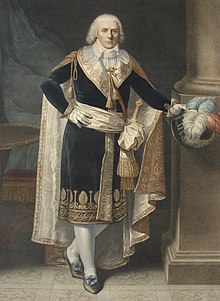Paul Barras

Paul François Jean Nicolas, Viscount de Barras (June 30, 1755 - January 29, 1829) French revolutionary and main political leader of the Directory between 1795 and 1799.
Coming from a family of the small aristocracy, born in Fox-Amphoux, in the current department of Var. At the age of sixteen he entered the Languedoc regiment, and was shipped to India in 1776. After an adventurous journey he reached Pondicherry and participated in the defense of that city, which ended in a capitulation to the British on October 18, 1778. After the liberation of the garrison, Barras returned to France. After participating in a second expedition to the East Indies in 1782-1783, he left the army and occupied the following years in indulging in frivolities pleasing to his class and his nature.
When the French Revolution broke out in 1789, he supported the democratic cause, and became one of the administrators of the Var department. In June 1792, he took his seat at the national high court at Orleans; and later that year, at the outbreak of war with the Kingdom of Sardinia, he became commissioner of the French army in Italy and entered the National Convention as a deputy for the department of Var.
In January 1793 he voted in favor of the death of Louis XVI. Most of his time, however, was spent on missions in the southeastern districts of France; and thus he met Napoleon Bonaparte at the siege of Toulon.
In 1794 Barras supported the faction that sought to overthrow Robespierre and his men, successfully concluding in the Thermidor coup d'état (July 27, 1794). The following year, when the Convention felt threatened by the disaffected National Guards in Paris, he appointed Barras to command the troops assigned to its defense. He appointed Bonaparte to be in charge of the defense, which led to the adoption of vigorous measures, which ensured the dispersion of the monarchists and discontents in the streets near the Tuileries, on the 13th of Vendimiario (October 5, 1795). With this Barras became one of the five directors who controlled the executive of the French Republic.
Due to his intimate relationships with Josephine de Beauharnais, Barras helped facilitate the marriage between her and Bonaparte. Bonaparte's achievements gave the Directory a stability it would not otherwise have enjoyed; and when in the summer of 1797 the monarchists and the constitutional opposition again joined forces, Bonaparte sent General Augereau, a stubborn Jacobin, to energetically repress that movement known as the coup d'état of the 18th of Fructidor (September 4, 1797).
Due to his intimate relationships with Josephine de Beauharnais, Barras helped facilitate the marriage between her and Bonaparte. Bonaparte's achievements gave the Directory a stability it would not otherwise have enjoyed; and when in the summer of 1797 the monarchists and the constitutional opposition again joined forces, Bonaparte sent General Augereau, a stubborn Jacobin, to energetically repress that movement known as the coup d'état of the 18th of Fructidor (September 4, 1797).
He was abandoned by the three Consuls who took the place of the five Directors and with this his political career came to an end. He had accumulated an enormous fortune that allowed him to live comfortably. Despite declaring himself a monarchist since 1815, he remained a suspect for the Bourbons.
Paul Barras died in Paris on January 29, 1829 and was buried in the Père-Lachaise Cemetery in Paris.
Contenido relacionado
Navarre (disambiguation)
1030s
880s